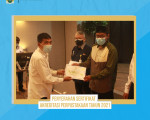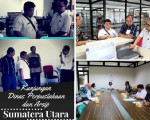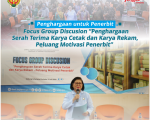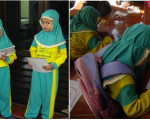How To Develop Library in Digital Age
Writer:
Hendrikus Franz Josef, M.Si
Regional Library and Archive Office of
2019
Abstract
As a provider and agent of information, the role of the library is not well known to many people and the wider society. On the other hand, people are familiar with the providers and institutions other information disseminators such as mass media units, such as television stations, radio or printed media which exists. Though seeing the tasks and functions that are very important to participate educate nation's life, libraries can play a role in helping improve welfare nation, through information services. In connection with that, the transition to the third millennium, it should be a momentum good for library service providers. Momentum for "contemplation" institutionally and again do more steps that are more integrated and directed, for the sake of improving the performance of library institutions. This is all in order to achieve the ideals of the nation, as well as the purpose and duties of a lofty library institution, namely to improve the welfare of the nation. The world moves faster. Thanks to the development of information technology, we can now receive information from other parts of the world in just seconds. Library user often read newspapers or magazines in paper material, but now theye read through screens of communication devices such as smartphone, tablet and laptop that we always carry anywhere. Transfer of knowledge is getting faster, but changing shape. Inevitably, the development of Information Technology has advanced very rapidly. All areas of life are almost nonexistent with the "miracle" of information technology. The futurists are competing to make predictions. Some predict that consumption of office paper will be less (paperless). There are also sociologists who predict the relationship between humans will be increasingly tenuous because of the increasing interaction between humans and the internet.
Part I
Library as
The position of the library, as a non-profit institution, both government and private, is very likely make it possible to achieve these ideals. Especially with the support of various parties, both from within and from outside the institution. Main tasks and functions of the library actually really in accordance with the times and is currently ’enjoying’ suitable momentum, if it can be utilized properly Where is the problem of information, especially information on science, technology and art and humanities becomes something very important and strategic for the community.
Not only for scientific community or academics, but also important for the wider community crave progress. Even more important will be the role of the library as the center of scientific information if it is associated with the ideals of the nation towards a new
On the other hand, the Indonesian people today are facing tough challenges. All people realize how many successive problems that afflict this nation, eventually lead to to a big problem, namely the emergence of an economic crisis. Economic crisis that befell the community in general is so heavy and accumulates for quite a long time, so one of them influences the ability of the community to obtain information important they need. This information actually exists, but is difficult to obtain. Thing this is because of the limitations and constraints of funds from information seekers. Other that, due to a prolonged economic crisis, problems arise slowly or obstructed development of information infrastructure to facilitate access to information, which should be built by the government with the community. All of this in turn makes people more difficult to access scientific information that they really need in the context of intelligence or in the framework of achieving welfare, even though the information is actually available overflow.
Based on the above thoughts, the library needs to further enhance its role in contributing to and accelerating the achievement of the coveted civil society. In this case the library can function as a communication medium for delivering information messages to the public. Although for that, in the midst of the storm of the economic crisis that is sweeping the nation, libraries must be smart to look for precise, conceptual, but practical steps to implement. These steps, although they need to be consistent with the main tasks and functions of the library, to sharpen specialization, but still need to be flexible in the ways and techniques of achievement.
Economic principles that have long been implemented successfully in the business world need to be implemented to ensure the continuity of activities. But the social function of a library in the context of providing information to the general public, may not be the time to be totally abandoned.
The problem in the world of scientific information, especially in
Another problem too actually there are among the various providers of scientific information in
Part II
Library Development Strategy in Digital Age
The library can actually play a role in enhancing the ability of human resources by providing information technology in
As is known that at this time the tendency of libraries and information centers is no longer each enriching the treasure of information possessed, but trying to enhance the ability to access information by providing facilities for that. Because information available throughout the world can now be more easily utilized by everyone. Therefore, even though an information center does not have a large wealth of information, but has the ability to access high information, then the information center will be able to provide better service. This can be achieved, among others, by building information technology facilities and network systems.
The network database that is formed will be better if not only in the form of bibliographic data, however equipped with additional information such as abstract, especially if with full text (full-text) for certain typical collections. Even if it can become a wealth of information today known as "Knowledge Management". Where in a database network system like this, not only collected data and information but also expertise in the meaning of knowledge networks stored in experts. At present it is actually known as some The library is competing to build a database in various fields, for example Indonesian Institute of Sciences with a database of appropriate technology that is classified as the most complete in Indonesia.
However, it would be more useful if for example a media was created that collected the database that was owned, not only by the library but also other information units which would have a mission with the library. Cloud storage can be created by
But the most important thing that is database technology with cloud computing should be easily made by anyone who wants to make it and has a wealth of databases. Therefore, the examples of appropriate technology must be chosen. Indeed, today such technology is available in
As is known, some libraries already have databases stored in cloud computing. But many of the library collections were made together with other information centers abroad. The search program is not yet popular in
Part III
Library Co-operation Strategy
In order for an activity to take place continuously, various aspects need to be considered. One aspect that is important is independence.
Information as a commodity according to Blasius (1996) is actually only limited to information that has gained added value. But this does not mean that all services must be free. Services with a special degree of comfort or have obtained special added value and cannot be funded by the government can be implemented by charging fees. Funds collected in turn can be used to improve the quality of the information provided.
Ibrahim in Mustafa (1998) gave an interesting view to pioneering the commercialization of information services. Based on research conducted in Malaysia, users are willing to pay for information for several reasons: they need fast information, but do not have time to search for themselves; information that fits their needs is presented in various sources, but they do not know it; they need information that is ready to use, not information that still has to be extracted from various sources; or they have no skills in tracking information.
Meanwhile, to ensure good cooperation and communication between library service providers, various cooperation forums have now been formed. For example the National University Library Forum and the Special Library Forum were formed nationally. Even in each province similar forums are being formed at the regional level. The existence of this forum would be able to encourage the formation of network systems and cooperation and mutual communication between library service providers from various types of libraries in
But in
But actually the most important of all so that the library gets attention is the library needs to show first the work performance with the existing conditions before demanding attention or assistance from the leadership. As a benchmark is the standard of service. Actually service standards are what the user wants, not what is said in the library service theory book.
Internet as Global Library
Entering the era of globalization and information technology, library users are increasingly dissatisfied with services that rely solely on printed bibliographic data, as long as this is provided by the library. Now library users have increasingly high demands, along with the development of information technology. More information is presented than on printed media. Various information has now been presented in a variety of media that are more interesting and complete. Interesting because not only is it presented textually, but it is combined with the media of still images, motion pictures, sound even with hypertext / hyperlink systems. With cheaper prices, more information is available in multi-media, full-text CD-ROM and in cloud computing.
For those who have internet access, they are increasingly free to access more up-to-date information. Therefore information managers need to prepare themselves better so that the library is not abandoned by its users. In addition, librarians, if not better prepared, enter a century that is dense with the use of technology, will be displaced by other professions in terms of providing and accessing information. One shortcut to that direction in the midst of the difficulties and limitations of infrastructure is to implement appropriate technology in the library. The application of a computer-based appropriate technology to improve service quality to users in a library certainly needs to consider the factors of funding, human resources, hardware, and software.
Conclusion
The existence of the internet is an interesting thing that must be used properly by librarians to improve the quality of their services. This new phenomenon will change the principle of service that has been embraced by the library which is enriching collections and increasing users to come to the library. With the internet service paradigm needs to be changed to enhance access to information and information sources. With the internet library services will break the limitations of space and time and bureaucracy. But to get to that condition librarians must prepare themselves by understanding some technical and practical things about the characteristics of internet service preparation.
Librarian need to concentrate on the content or content of information rather than the internet infrastructure that has been initiated and handled by the profession or other parties. Librarians need to change their attitudes and work culture to fit the present conditions that require fast and precise but efficient work. So it's not working hard but working right or smart. The momentum of reform needs to be used to also carry out reforms in the field of libraries, documentation and information towards more professional quality services. In this reformation, in addition to being labor intensive and capital intensive or in technology, it has also been necessary to be intensified by creations. Especially among librarians. Therefore, librarians need to keep abreast of developments by utilizing information and facilities more and more is available. So in principle librarians need to change work patterns to be able to keep up with developments properly.
However, information provider institutions such as libraries, which have been known as institutions that are not yet commercially viable, must always try to provide quality information services to their users. To achieve this, the library needs to return to conceptual but practical steps in mitigating the current economic crisis. The strategic position as a non-profit institution can be utilized by libraries to become the center of the development of a network of national scientific information providers that can take part internationally.
Tactical and practical thinking and steps, in accordance with technological advances, must also be developed to meet the information needs of the community. A new approach to information services during the economic crisis needs to be taken. One of them is by providing quality but affordable information, but still providing economic value to the institution. Thus the library can someday become a more independent institution in carrying out its activities.
Bibliography
Bullpitt, Graham. Planning for quality in academic libraries. Handout at a one day seminar at the British Council Jakarta, 1998.
Duncan, Moira. Charging for information special. Aslib Information. March 1990, Vol. 18 No. 3;
GORMAN, Michael. The academic library in the year 2001: dream or nightmare or something in between?, Journal of Academic Librarianship, 1991; .
LIM, Edward. The internet and its impact on libraries and national development in
Mustafa, B. Perubahan paradigma layanan perpustakaan di era teknologi informasi. Jurnal
Pustakawan
Mustafa, B. Komersialisasi layanan perpustakaan: tinjauan dan prospek. Makalah pendukung yang disampaikan dalam beberapa seminar.
RIZZO, Joe. Ten ways to look at a library. American Libraries April, 1992;
ROBERTS,
Sudarsono, Blasius. Nilai ekonomi informasi bagi perpustakaan. Makalah ringkas dalam suatu diskusi di
SULISTYO-BASUKI. Perubahan paradigma dalam sistem informasi. Makalah pembuka pada
Seminar Sehari Layanan Pusdokinfo Berorientasi Pemakai di Era Informasi, diselenggarakan
oleh Program Studi Ilmu Perpustakaan, Program Pasca Sarjana Universitas
Perpustakaan Lainnya
 Penyerahan Sertifikat Akreditasi Perpustakaan Tahun 2021
Penyerahan Sertifikat Akreditasi Perpustakaan Tahun 2021
Setelah menunggu beberapa bulan sejak pelaksanaan akreditasi perpustakaan, akhirnya semua peserta akreditasi perpustakaan tahun...
 Grhatama Pustaka menerima Kunjungan dari Dinas Perpustakaan dan Arsip Daerah Sumatra Utara
Grhatama Pustaka menerima Kunjungan dari Dinas Perpustakaan dan Arsip Daerah Sumatra Utara
Rabu 14 Februari Grhatama Pustaka menerima kunjungan kerja dari rombongan Dinas Perpustakaan dan Arsip Daerah Sumatra Utara yang...
 FOCUS GROUP DISCUSION (FGD) "PENGHARGAAN SERAH SIMPAN KARYA CETAK KARYA REKAM : PELUANG MOTIVASI PENERBIT"
FOCUS GROUP DISCUSION (FGD) "PENGHARGAAN SERAH SIMPAN KARYA CETAK KARYA REKAM : PELUANG MOTIVASI PENERBIT"
Dinas Perpustakaan dan Arsip Daerah (DPAD) DIY pada hari Selasa (11/7) bertempat di Ruang Seminar, Gedung Grhatama, DPAD DIY,...
 Lomba Mewarnai TK ABA Wonokromo di RBM
Lomba Mewarnai TK ABA Wonokromo di RBM
Sabtu 16/01/16 TK ABA Wonokromo mengunjungi RBM (Rumah Belajar Modern) dengan 4 guru pendamping dan 46 anak. Acara yang dilakukan...

 Penyerahan Buku KCKR dari Lintang Pustaka Utama
Penyerahan Buku KCKR dari Lintang Pustaka Utama